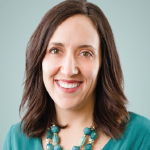
Ms. Hughell
LH: For me, the most rewarding aspect of being an ARP volunteer is that I have gotten to know the various experiences, backgrounds and opinions of health professionals who practice all over the country. I have met wonderful people through the ARP who have taught me so much and have become dear friends. I think my most interesting experience was being on the planning committee for the annual meeting and collaborating with other health professionals to plan sessions. It has, however, been more challenging to volunteer since the COVID-19 pandemic began. Because we are not traveling, my committee work is done remotely, thus it is harder to synergize as a committee.
TR: What type of mentorship have you received for developing leadership skills?
NF: While I was initially going to pursue leadership opportunities with the ARP, it was the time when I was going through tenure and my advisors said, ‘Now is not the time to get involved in that.’ (I do regret following their advice.) The way they are structuring the leadership track at the ARP has only improved and is very transparent and supportive. If a volunteer has leadership aspirations, there is no shortage of people who are willing to talk, help determine the best approach to a given situation and provide clear guidance on what is needed.
LH: Although I have not been involved in formal mentoring through the ARP, over the years the leadership has encouraged me to get involved in a variety of opportunities that would stretch me in a professional manner. As such, I have undertaken activities that I otherwise would not have, such as editing rheumatology curricula.
TR: How difficult/easy was it to volunteer with the ARP?
NF: Extremely easy. Even if you are undecided as to whether you want to volunteer, I recommend filling out the form and ranking your committees of interest. When someone from the ARP calls you for an initial conversation, then they may tell you things that open up your thought process about the benefits of volunteering for a given committee. And rest assured there is a lot of outreach along the way so you won’t blindly volunteer for something.
Being on a committee, you are surrounded by people who communicate in a professional manner and who are accepting of opposing viewpoints. They are accustomed to compromise and understand the way to reach a consensus via teamwork.
LH: I found the process of volunteering to be a smooth one, with ample support and detailed guidance from members who had encountered similar issues on prior occasions. Committee chairs have always been helpful in guiding committee members on what needs to be done.
TR: Why do you value volunteering?
NF: Frankly, the members are wonderful, and the staff is astonishingly organized. For example, at this year’s Membership and Nomination Committee, they had any information required at their fingertips—there was no, ‘We’ll get back to you.’ Importantly, they maximize their efficiency because they realize that volunteers have primary jobs, and they want to make it as easy on us as possible to continue to volunteer.
As an ARP volunteer there is an ongoing and stimulating exchange of knowledge that I would not have access to if I did not donate some of my time to the organization. It’s a great way to learn what other types of practitioners are doing in the field and to ask questions in an informal way. It helps you get out of your own little ‘bubble.’
LH: Volunteering with the ARP keeps me engaged in the field of rheumatology and dedicated to rheumatology as a physician assistant. I would say that this work had enhanced my sense of professional pride—I am proud of the organization, the people and the knowledge I have gained.
TR: What advice would you give to new members hoping to get involved?
NF: I would say to ease your way in, perhaps by first participating in abstract review in preparation for the annual meeting (an easy, one-time occurrence). You can select a topic area and you will be assigned several abstracts to review and grade. Then, assuming that this goes well, you could volunteer to moderate a session. It is a straightforward process as they tell you what to do, namely, introduce people, and get the questions rolling. It is an ideal way to meet new colleagues from around the country.
Take every opportunity offered, and if you try one committee and it’s not what you expected, then try a different one. Take baby steps and you will be shocked at the unexpected benefits that come from volunteering your time.
LH: Just do it. Try things out. … Get out of your comfort zone and you will therefore grow professionally in the process. Be open-minded about being on different committees—just think how much you will learn. Volunteering at the annual meeting is a great opportunity for micro-volunteering, such as moderating sessions and topic tables.
How You Can Get Involved
ARP committee nominations are open Nov. 1–Feb. 1. All members interested in a three-year committee position or a micro-volunteer opportunity are encouraged to submit an application. Visit https://www.rheumatology.org/Get-Involved/Volunteer/Board-Committees for more information about open opportunities. Still have questions? Send an email to [email protected]. R
Elizabeth Hofheinz, MPH, MEd, is a freelance medical editor and writer based in the greater New Orleans area.


